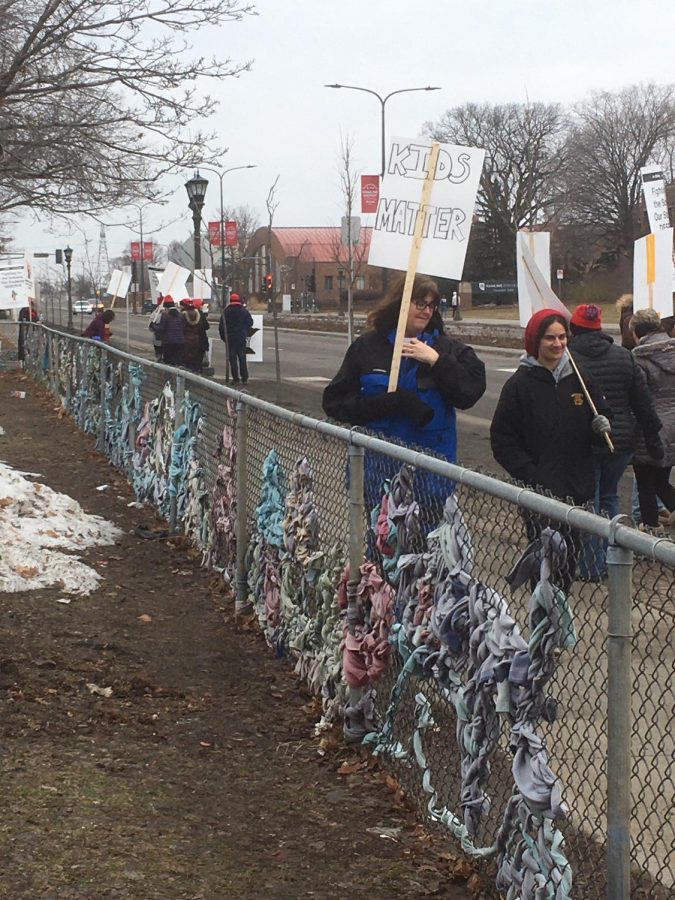Why you should support the teacher strike
St. Paul teachers were on strike over lack of student support resources and teacher wages.
St. Paul public school teachers held signs on the sidewalk along Snelling Avenue outside Hamline Elementary during a threeday strike which lasted from March 10 to March 12. A settlement was reached on Friday, March 13.
March 18, 2020
If you were anywhere near the intersection of Snelling and Englewood last week (March 9-13), it’s likely that you heard drivers leaning on their horns in support as they passed a gaggle of sign-toting, red-hat wearing people on the far side of the street.
Perhaps you were irritated by this disturbance, but after reading this article, I hope those horns will become music to your ears.
On Thursday, March 12, St. Paul Public Schools, including Hamline Elementary, were cancelled for the third day in a row due to an ongoing teacher strike. As the strike progressed, the district threatened to lay off thousands of teaching assistants. Negotiations between union members and the district persisted throughout the week.
The strike ended on Friday, March 13, in large part due to concerns about the outbreak of the coronavirus. Both the union and Superintendent Joe Gothard have both claimed that some agreements were reached, but the details of said agreement are not yet clear.
How did things come to this in the first place?
There’s no better person to tell you than Ray Doss, a senior and education major.
“It’s kind of the culmination of about ten months of negotiations,” Doss said. “The teacher’s union was asking some things of Saint Paul Public Schools, those things including more culturally competent people working in the schools, more mental health services for the students, and a 3% pay increase for the teachers that will happen over the next three years. In my opinion, that’s not that big of an ask.”
He’s right. Things like mental health and linguistic support are basic needs for all schools: primary, secondary or postsecondary. If teachers claim that their school needs to be improved in these fields, we should believe them. They would know.
“Ideally, schools would just have the support they need,” said one parent and union member at the strike, zipping her child into a pink Hello Kitty jacket on a squally Wednesday morning, “So that every student can get the attention they need every day they’re here learning, instead of having to wait or having stressed out teachers that can’t do everything they need.”
This strike has been causing problems; parents who are used to relying on schools to look after their children while they work are scrambling to make arrangements, and student workers, who regularly work as tutors at Hamline Elementary, are temporarily out of jobs. This has spread the misconception that the strike is a selfish action by teachers solely to increase their wages.
First of all, as previously mentioned, this strike is mainly about acquiring better resources for the students. While wage does play a small part in the motivation for the strike, not a single teacher I talked to even mentioned it as a reason for their protest.
Secondly, the strike could have easily been avoided.
“[Teachers] have been threatening to do this for a long time,” Doss said. “It didn’t have to come to a strike.”
Had the district collaborated to reach an agreement with the union earlier on, parents wouldn’t have to be working overtime to find a place for their child to stay during the day.
Lastly, even if it was only about wage, it’d still be justified.
Teachers are important. Really important. Teachers are more important than the President of the United States.
Sure, maybe the President helps make decisions that will impact the country as a whole, but teachers have impacted every single one of us individually. Not only have they provided us with an education that allows you to read and understand this article in the first place, but they’ve also shaped our very identities. They teach us values and morals alongside reading and math.
Teachers make us good people. Without them, our society would crumble into ruins, and we probably wouldn’t even have a country for a President to run.
The fact that they’re paid obscenely low wages as they are isn’t only a shame, it’s a downright atrocity.
Yet wage isn’t even what this strike was about. It was about the students.
“You go into classrooms now, and it’s really rough,” Doss said. “You have teachers that have 35 or 40 student classrooms, so to expect teachers to deal with issues and mental health crises among students, that’s just impossible. Expecting schools to help with that just makes sense to me.”
If it makes sense to you too, union members at the strike recommend that you email Superintendent Joe Gothard at joe.gothard@spps.org and let him know you support the teachers union strike.
Hopefully, the agreement that was reached on Friday satisfies (or exceeds) the basic needs of St. Paul classrooms. However, if it was at all compromised by this pernicious virus, I think we can safely assume that the teachers who hold our very society on their backs will take up the fight once more as soon as they are able.

